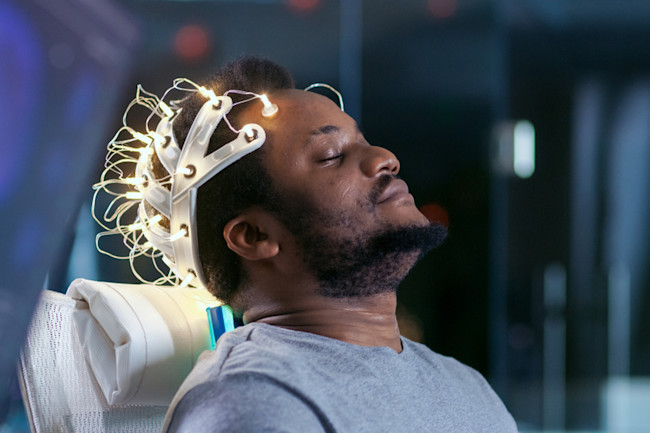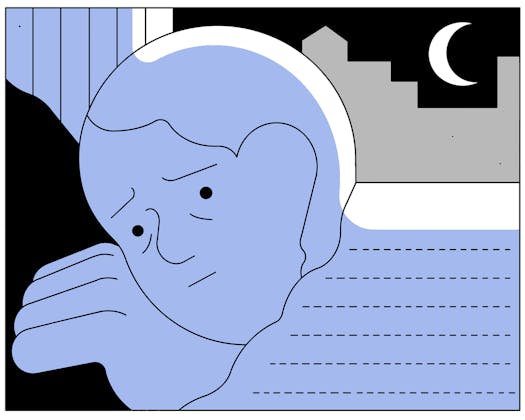“Why can’t I sleep?” It's one of the top search phrases on Google. So many people struggle to sleep well, and I know from personal experience how frustrating it is to not know why.
As a functional diagnostic nutrition practitioner, I believe that most insomnia for most people is caused by something physical going on in the body. From what I’ve learned in my training, there are five main physical reasons why people can’t sleep. I’ll share them today to give hope that there is a reason you aren’t sleeping, and that you can find out why and fix it.
The first common cause of insomnia is hormone imbalance. This can be sex hormones like low oestrogen and progesterone or high testosterone, all of which can cause sleep issues. Finding out your hormone levels is key to overcoming your sleep problems. As a functional medicine practitioner, my goal is to find out why those hormones are low so that we can get things back in balance and not have to take meds or supplements forever.
Martha Lewis
There are other hormones that can affect your sleep, too, especially cortisol. I’ve found that many of my clients have insomnia because they’re releasing cortisol at night when they shouldn’t be. Cortisol suppresses melatonin and wakes you up, causing racing thoughts that are hard to control. Figuring out why your body is releasing cortisol is key.
Another reason you may be waking up at night or having a hard time falling asleep is from eating food you’re sensitive to. Many people are sensitive to the Big Five: gluten, dairy, eggs, soy and corn. You could also be sensitive to foods that you think of as healthy, like broccoli or salmon. The more food sensitivities people have, the more unhealthy their guts are. The idea isn’t to avoid these foods forever but to eliminate them temporarily and work on healing the gut so that you’re able to tolerate most foods in the future.
Eating foods you are sensitive to affects your sleep because it causes low-grade inflammation, day and night. Cortisol is an anti-inflammatory hormone and so it comes to the rescue to deal with that inflammation. When that happens at night, it wakes you up and makes it hard to go back to sleep. I run a food sensitivity test on clients so I can quickly find out what they’re reacting to that is causing inflammation.
Another major cause of insomnia is mineral imbalance. The most important thing to know is that minerals need to be in balance with each other. Too much calcium, for example, can deplete magnesium. Both low calcium and low magnesium can contribute to insomnia. If you’ve struggled to sleep, you’ve probably tried magnesium. While magnesium is critical for sleep, you need the right balance of other vitamins and minerals to absorb it. I use a hair tissue mineral analysis test to assess mineral status and deficiencies. This test also gives insight into how different systems in the body are working: thyroid, adrenals, blood sugar, nervous system, stress, hormones and more. With this valuable information, we can get minerals back in balance to help get your systems back in balance, too.
The fourth reason why you’re waking up at night has to do with your gut. When your gut wall is damaged, toxins leak through and enter the bloodstream, causing lots of inflammation. You develop a leaky gut from stress, toxins like antibiotics and pesticides, eating foods you’re sensitive to and gut infections from parasites or candida.
Another way the gut affects sleep is called dysbiosis, or an imbalance of bad and good bacteria. Good bacteria are in charge of making neurotransmitters such as serotonin, dopamine and GABA. Up to 90% of melatonin is made in the gut. When bad bacteria run the show, the good bacteria can’t do their job of producing these hormones that help you feel good, relax and sleep.
Having a parasite or an infection in your gut can also sabotage sleep. The middle of the night is when these creatures are active and releasing toxins, which causes inflammation. The most common reason I find my clients wake up at 3 or 4 a.m. is because they have a gut infection. It’s impossible to heal the gut and for beneficial bacteria to thrive if you don’t address the infection.
The last common but little-known cause of insomnia is your liver. When your liver is backed up and can’t process all the toxins in your body, those toxins continue circulating, causing lots of inflammation. According to the Chinese meridian clock, between 1 and 3 a.m. is when the liver is most active. If you have a parasite, it’s releasing many toxins at this time. So not only is the parasite causing inflammation, it’s also releasing more toxins than your body can handle, which wakes you up.
These are just some of the reasons why you may not be sleeping well, and many of my clients have more than one of these. Functional lab testing will tell us what’s going on in your body that’s causing your insomnia so that we can correct it and improve your sleep and your health.
As always, wishing you a good night’s sleep.
Martha Lewis is a Functional Diagnostic Nutrition® practitioner and owner of the Complete Sleep Solution. Follow her on Instagram and Facebook @completesleepsolution.








